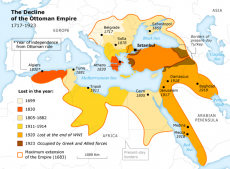
The Ottoman Empire was a massive kingdom, based in what is now modern-day Turkey. In the history books, especially European history books, it’s portrayed in a mostly negative light. For instance, the phrase “sick man of Europe” originates from the 19th century, and it was talking about the Ottoman Empire’s economic and military decline. The fact that the Ottoman Empire was led by Muslims, and not Christians, also meant that Western powers could talk about it in a bad way. Their arguments would be more convincing because people in Europe often (as many still do) thought Muslims were barbarian and basically “different” to them.
The Ottomans, as we’ve already gathered, were Muslim. They originated in Central Asia, in a region we might link nowadays to Turkmenistan and Kazakhstan. This means they were not Arabic, i.e. people who came from the Arabian Peninsula and North Africa. In fact, they had their own language – Turkish – which dated back to tribal days. The Ottoman Empire conquered many Christian nations, even in its early stages. These included Greece and Armenia. Their eventual goal was to reach Vienna, and they did, but the city managed to repel them in 1683. So, as we can see, there were many people of different religions living under the Ottoman Empire at any one time. Christians and Jews formed an important part of the patchwork cloth of Ottoman life, and we’ll have a look in greater detail at religion in a separate article.
The Ottoman Empire was founded in 1299 by Osman the First, in Northern Anatolia. It then began to expand in the Balkan region in the 14th century, and the Empire was at its biggest in 1683. It governed a massive territory, which included all of Greece, most of the North African Coast, all of the Red Sea coasts, most of the Balkans, as well as parts of the Middle East and Caucasus regions. Importantly, the Ottomans controlled Mecca and Medina (the two holy cities of Islam), as well as Jerusalem, after the 16th Century. To demonstrate the vastness of the Empire, let’s just say the Spanish were afraid of the Ottomans, who faced them on the North African coast. The Hapsburg Empire was also concerned with their expansion, as was Russia, Arabia, and the Middle East region. Look on any map and you’ll see just how big it was!
Although the system was governed relatively well (which helped it exist for such a long time), the Empire had to be dissolved in 1923. The Ottomans lost a series of wars, the most important being the First World War, in which it sided with Germany. If you remember my article on Venizelos, he sent in troops in 1920 to occupy parts of the Empire where Greece had the most interests, and the Great Powers did the same. All of this helped motivate the Turkish Nationalists into action, who essentially believed in kicking the foreigners out and creating a new country, independent of their influence. The most famous of these leaders was Kemal Ataturk, a man whose name you’ll probably see everywhere in Turkey today.
Its influence in the Mediterranean is visible everywhere, you don’t even have to look for it. Everywhere, you’ll find the remains of a mosque or government building that once housed the Muslim residents of that area. It’s actually quite sad when you think about it – at the demise of the Empire, countries were keen to send their Muslim subjects there, and approximately 7-9 million refugees were created as a result.
Image from: https://chronicle.fanack.com/turkey/history-past-to-present/decline-of-the-ottoman-empire/

0 Comment:
Be the first one to comment on this article.